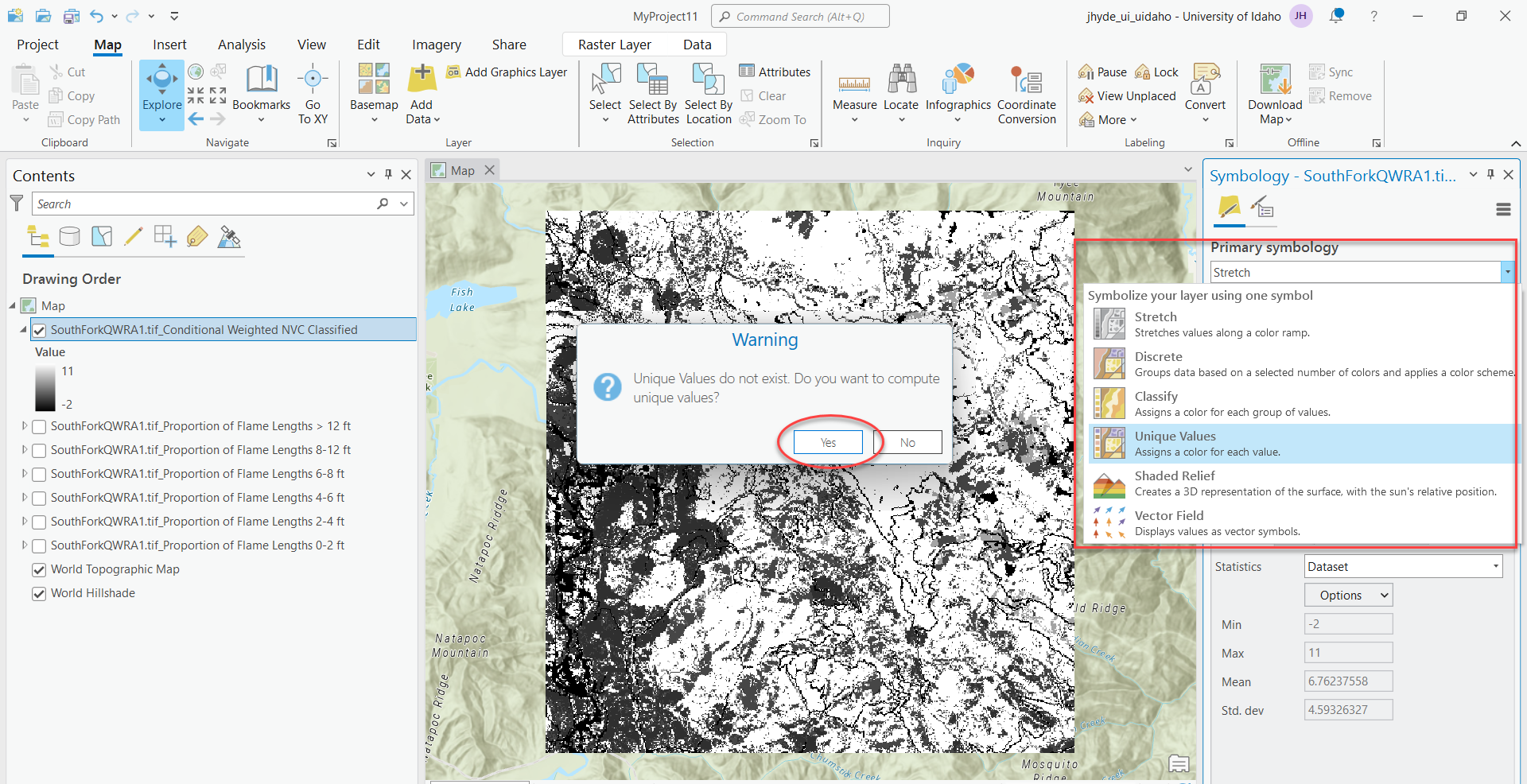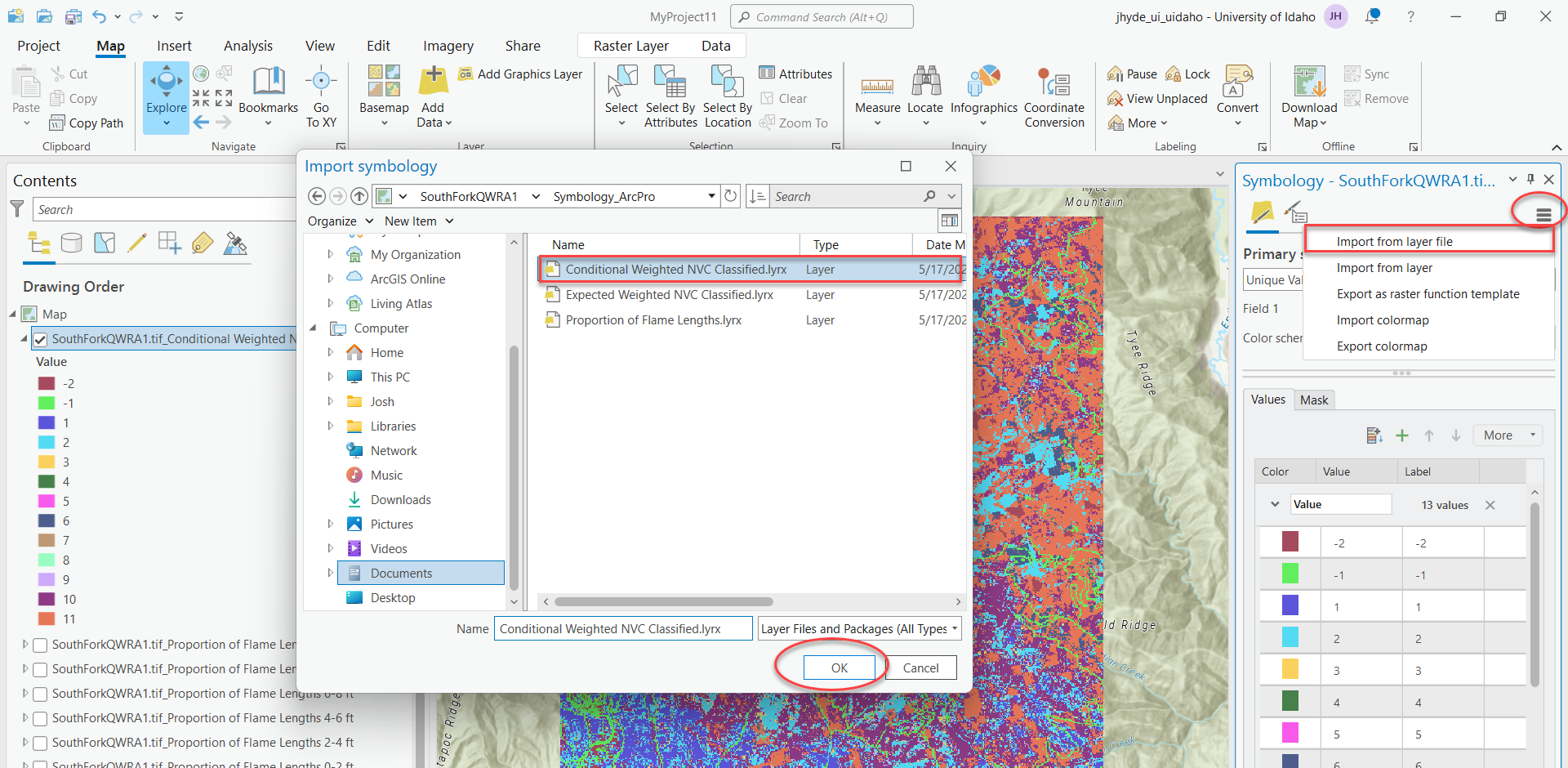IFTDSS uses a specific color scheme for Map Studio and report figures. You can duplicate this color scheme in ArcGIS Pro using the .lyrx files contained in the "Symbology_ArcPro" folder of the QWRA download package. The .lyrx file contains all the color specifications used by IFTDSS.
Lyrx files in the QWRA package include:
- Conditional Weighted NVC Classified.
- Expected Weighted NVC Classified.
- Proportion of Flame Lengths.
In the QWRA download package available in IFTDSS, we include a folder entitled "Symbology_ArcPro." The symbology folder contains ArcGIS Layer (.lyrx) files to define the symbology for most of the layers visible in Map Studio for use in ArcGIS Pro. In the GeoTIFF, the QWRA layers are both categorical and continuous data, therefore importing the symbology is slightly different for the two types.

Importing Symbology for Conditional Weighted NVC Classified and Expected Weighted NVC Classified
The same steps are completed to import the symbology Conditional Weighted NVC Classified and Expected Weighted NVC Classified. These data sources are categorical data. The following steps outline how to import the symbology for categorical data. The example below uses Conditional Weighted NVC Classified; however, the same steps hold true for the Expected Weighted NVC outputs as well.
-
Open an ArcGIS Pro session and add the layers you would like to map. For more information on how to add layers to ArcGIS Pro see the Opening an IFTDSS GeoTIFF file in ArcGIS Pro topic.
-
Right-click the “Conditional Weighted NVC Classified” layer and click Symbology.

-
In the Symbology pane go to the Primary Symbology dropdown and select "Unique Values." You may get a pop-up window asking if you would like to compute unique values. Click Yes.

-
Click the Options icon
 toward the top right of the Symbology pane. In the dropdown that opens, click Import from layer file. This opens the Import Symbology browse window. Select the "Conditional Weighted NVC Classified.lyrx" file located in the "Symbology_ArcPro" folder of your IFTDSS download package, and click OK.
toward the top right of the Symbology pane. In the dropdown that opens, click Import from layer file. This opens the Import Symbology browse window. Select the "Conditional Weighted NVC Classified.lyrx" file located in the "Symbology_ArcPro" folder of your IFTDSS download package, and click OK.
-
Now you can see the Integrated Hazard layer in ArcGIS Pro (top) is the same as it is in IFTDSS Map Studio (bottom).

Applying Symbology for Proportion of Flame Lengths
The same steps are completed to import the symbology for all six of the Proportion of Flame Lengths layers. These data sources are continuous data that are classified into distinct bins. The following steps outline how to import the symbology for continuous data. The example below uses Proportion of Flame Lengths 0-2 ft; however, the same steps apply to the other continuous data layers.
- Open ArcGIS Pro session and add the layers you would like to map. For more information on how to add layers to ArcGIS Pro see the Opening an IFTDSS Geo Tiff file in ArcGIS Pro topic.
-
Right-click the “Proportion of Flame Lengths 0-2 ft” layer and click Symbology.

-
In the Symbology pane go to the Primary Symbology dropdown and select "Classify."

-
Click the Options icon
 toward the top right of the Symbology pane. In the dropdown that opens, click Import from layer file. This opens the Import Symbology browse window. Select the "Proportion of Flame Lengths.lyrx" file located in the "Symbology_ArcPro" folder of your IFTDSS download package, and click OK.
toward the top right of the Symbology pane. In the dropdown that opens, click Import from layer file. This opens the Import Symbology browse window. Select the "Proportion of Flame Lengths.lyrx" file located in the "Symbology_ArcPro" folder of your IFTDSS download package, and click OK.
-
Now you can see Proportion of Flame Lengths 0-2 ft in ArcGIS Pro (top) is the same as it is in IFTDSS Map Studio (bottom).
